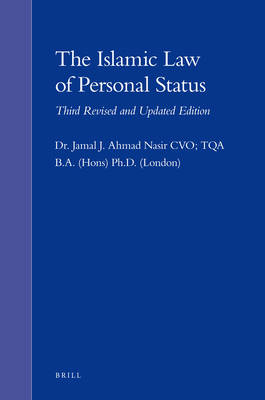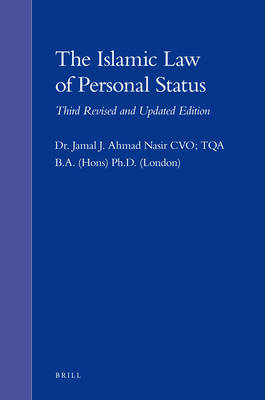
- Afhalen na 1 uur in een winkel met voorraad
- Gratis thuislevering in België vanaf € 30
- Ruim aanbod met 7 miljoen producten
- Afhalen na 1 uur in een winkel met voorraad
- Gratis thuislevering in België vanaf € 30
- Ruim aanbod met 7 miljoen producten
Zoeken
The Islamic Law of Personal Status
Third Revised and Updated Edition
Jamal J Nasir
Hardcover | Engels
€ 315,95
+ 631 punten
Uitvoering
Omschrijving
This new edition of the authoritative English-language treatment of Islamic personal status law gives practitioners and courts throughout the world direct access to this important body of law in its most up-to-date development. All Middle Eastern and North African Arab states are covered; new to this edition is coverage of recent provisions enacted in Kuwait, Yemen, and Sudan. The chapter on dissolution of marriage has been completely revised to reflect current legal interpretation and judicial practice in this rapidly changing area of Islamic law. Also new and especially valuable are English versions, for the first time anywhere, of fundamental Shiite and Jaafari legal works with the most thorough analysis and commentary available in any non-Arabic source.
Dr. Nasir's much-appreciated methodology has been continued since the very successful first edition of 1986. For each topic - e.g., marriage, dower, dissolution of marriage, parentage, inheritance, and waqf - he begins with a consideration of the subject in Sharia law, and then goes on to present legislation and contemporary views, in particular Arab countries. This approach, while it clearly manifests the continuity of Islamic law respecting personal status, is of great practical value to judges and practitioners, especially those who must resolve disputes under Islamic law in non-Muslim countries.
Dr. Nasir's much-appreciated methodology has been continued since the very successful first edition of 1986. For each topic - e.g., marriage, dower, dissolution of marriage, parentage, inheritance, and waqf - he begins with a consideration of the subject in Sharia law, and then goes on to present legislation and contemporary views, in particular Arab countries. This approach, while it clearly manifests the continuity of Islamic law respecting personal status, is of great practical value to judges and practitioners, especially those who must resolve disputes under Islamic law in non-Muslim countries.
Specificaties
Betrokkenen
- Auteur(s):
- Uitgeverij:
Inhoud
- Aantal bladzijden:
- 288
- Taal:
- Engels
Eigenschappen
- Productcode (EAN):
- 9789004177154
- Verschijningsdatum:
- 1/09/2009
- Uitvoering:
- Hardcover
- Formaat:
- Genaaid
- Afmetingen:
- 160 mm x 236 mm
- Gewicht:
- 566 g

Alleen bij Standaard Boekhandel
+ 631 punten op je klantenkaart van Standaard Boekhandel
Beoordelingen
We publiceren alleen reviews die voldoen aan de voorwaarden voor reviews. Bekijk onze voorwaarden voor reviews.








